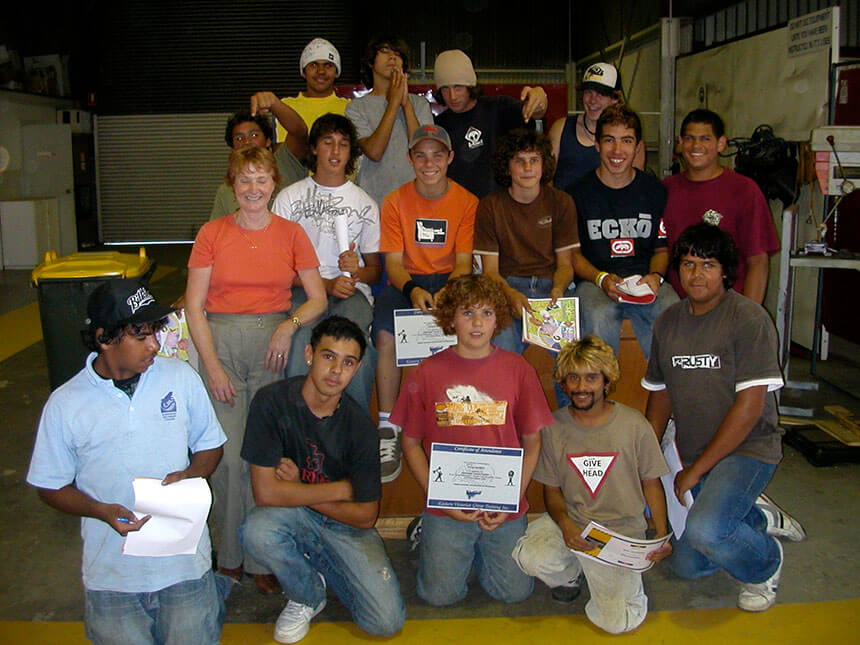After 17 years, Changing Lanes - a holistic program catering for the educational needs and wellbeing of Bairnsdale’s most vulnerable young people - has closed its doors, bringing to an end an important chapter of alternative education in Bairnsdale.
Changing Lanes was established by the East Gippsland Local Learning and Employment Network (EGLLEN) in 2003 as a result of growing community concern for an identified group of almost 200 young people in the Bairnsdale region who were not engaged in school, work or further education and training.
This initiative brought together an army of local employers, caretaker organisations and the school community who set about providing this group of young people with an alternative to mainstream schooling which would also allow them a safe place to mature.
Michael Nelson was at this time the vice principal at Nagle College where he had established a program with Peter Argentino, a talented mechanic and panel beater, to work with disengaged young people.
This program, based on developing hands on automotive skills, was called Changing Lanes and was demonstrating success rebuilding the lives of the young participants and assisting them to reengage with education and the wider community.
The EGLLEN committee approached Mr Nelson to establish and coordinate an alternative educational facility that would meet the needs of the target group who had been failed by mainstream education.
He in turn coopted Peter and his successful program. The Victorian Certificate of Applied Learning (VCAL) had just been introduced and was not yet a feature of mainstream curriculum and this program was used in conjunction with the automotive workshop to create Changing Lanes.
In its infancy the program was located in the old secondary college portable in Rupert Street where the U3A is now located. The roof was falling in, but Michael and his team salvaged and scavenged the equipment needed to provide the fledgling program with the necessary equipment to operate and each day Mr Nelson fed the students a variety of meals cooked on a trusty barbecue while Peter was working with his charges in a Nissen hut located several blocks away.
Key to the program’s success was an understanding of the autonomy needed to stand alone from mainstream educational facilities.
Changing Lanes initially catered for young people aged between 15 and 18 who were not attending school and in its first year 75 students moved through the program.
During the ensuing years the cohort has changed, especially after the introduction of VCAL to mainstream education and suitable TAFE alternatives, but one constant factor has been that the young people knew they always had the support of teachers and staff at Changing Lanes and the number of young people to pass through the program each year remained high.
Over the years more and more students have been sent to the program directly from the secondary college and this has seen younger and older students enrolled.
None were turned away and all were taught that respect for staff, property, self and each other was paramount.
In 17 years, this has rarely been challenged. Indiscretions are acknowledged and forgiven. Every day is a fresh start.
SUPPORT FROM DAY ONE
Some of the students have families who support them, but many have not. Many have experienced homelessness and couch surfing while others are brought to the program by Berry Street, Department of Health and Human Services (DHHS), Nungarra (formally Merindo) and the courts.
Each day starts with Maslow’s assessment of needs, firstly checking to see if a shower or change of clothes is necessary before starting the day with breakfast (if needed) and later morning tea and lunch using food provided every week by Patties and Dennisons and supplemented by fresh vegetables and eggs from Mr Nelson’s family garden.
The Changing Lanes program has always seen a disproportionate number of First Nations students enrolled in the program. Prior to the current climate of the Black Lives Matter movement, First Nations students have always known that they were an integral part of the campus community.
Michael has brought his understanding of human nature learnt during his Nowa Nowa upbringing to the program, where his earliest playmates were drawn from the local indigenous community.
His unique understanding of this demographic has helped to shape the philosophy of the Changing Lanes team, which has always been fair and inclusive for all.
Fortuitously, in the second year of the program Mr Nelson had a meeting with the then Workways chief executive, Pam Elliott, and the plan to buy land and build a purpose-specific building to cater for the complex needs of this population emerged.
The three Bairnsdale Rotary clubs worked to provide free drafting and architectural plans. Workways paid for the two-story building designed by Michael to cater on site for student needs. Whelans, Cranes and Bairnsdale Asphalting landscaped and prepared the site for building. In 2008, the building was opened by then MP, Craig Ingram, and staff and students moved in.
Staff wondered how their students would treat a building that wasthe years pro theirs and the answer is that after 14 years in the Changing Lanes building, there has been no graffiti, vandalism or deliberate damage.
The building consisted of two classrooms upstairs, an art and recreation area downstairs, a fully functional kitchen (equipped by community members and community groups) with a large waiters’ pantry, shower, washing machine and dryer, an office and a separate reception area – used to train students.
One area has always been set aside for either a pool table or table tennis table and it is here that the students have learnt the most valuable life lessons.
IMAGE: Changing Lanes catered for East Gippsland’s most vulnerable youth. (PS)
Closing doors on Changing Lanes
